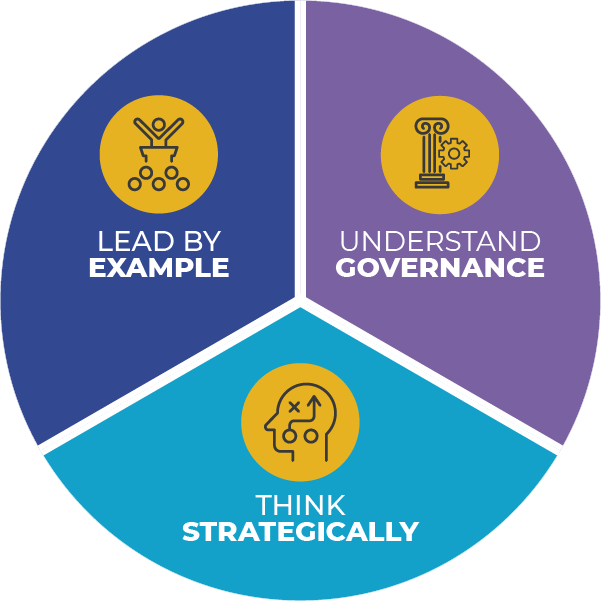
You are viewing the Institution version of this CEO Update. Institutionally Related Foundation and System versions are also available.
Board service is a team sport, and strategic governing boards act collectively to perform their duties while knowing the impact of the board is only as strong as its individual members. Further, consequential board members consistently ask themselves how they can best contribute individually to the outcomes that advance the institution they serve.
What can individual board members do to make their service more productive, effective, and meaningful? They can rely upon AGB’s Principles of Trusteeship.
Thoughtful and engaged board members leverage the Principles of Trusteeship to inform their perspectives, guide their actions and decisions, and sharpen their strategic priorities and desired outcomes.
Why it matters: Strategic governing board members focus on outcomes and priorities. Importantly, they can only do so effectively if they understand governance, think strategically, and lead by example, which are the three primary functions of board member service described in Principles of Trusteeship.

Consider how the Principles of Trusteeship would guide your thinking in the following scenarios:
Principle 2: Respect the difference between the board’s role and the administration’s role.
- A seasoned athletics committee chair believes that a relationship between the university and a new NIL (name, image, and likeness) collective could benefit players and the institution’s football program. This board member is a business executive and knows that having preliminary conversations with the collective’s leaders could smooth the process and make the decision easy for the president and the board. What should this board member do?
Principle 5: Think independently and act collectively.
- The CEO of one of the largest employers in the state contacts a board member of a nearby institution, complaining that it is not graduating enough students to align with the employer’s needs. While this CEO, a well-known public figure in the region, has championed the institution in the past and encouraged many students to seek credentials to advance their careers, this leader is now questioning the value of the institution. What should the board member do?
Principle 8: Focus on what matters most to long-term sustainability.
- At the onset of the COVID-19 pandemic, a small college quickly transitioned its academic programming from a residential, in-person structure to almost entirely online instruction, changed course offerings, and adjusted faculty and staffing needs. Now, the faculty union is calling for a greater say in academic decisions and accusing the governing board of ignoring shared governance. The board chair recognizes the value and importance of shared governance to the long-term sustainability of the institution but also acknowledges the need for the college to take a different approach from two or three years ago. What should the board chair do?
Go Deeper:
- Read more about the Principles of Trusteeship and learn how they strengthen board members’ capabilities and augment boards’ capacity.
- Review the Trusteeship magazine article “What Kind of Board Member Are You?”
- Review the Principles of Trusteeship with a trusted AGB facilitator at your next board meeting or retreat.
Questions for Board and Committee Chairs
- How can you encourage your fellow board members to review and reflect on the Principles of Trusteeship?
- How will the principles guide your service as a board or committee chair?
Questions for Board Members
- How will you use the Principles of Trusteeship to enhance your board service?
- How can you hold yourself and your fellow board members accountable for creating an effective board culture?
Questions for Chief Executive Officers and Leadership Team Members
- How can you help reinforce the tenets contained in the Principles of Trusteeship?
- How might the Principles of Trusteeship be adopted into board orientation and ongoing education?
An insight that sticks with me from one of the Principles of Trusteeship authors is that board service is not about sitting on the board; it is about serving on the board, by preparing, attending, and speaking during board meetings. With that in mind, I hope you enjoy the rest of your summer feeling confident, energized, and prepared to offer your service to your students, your institution, and your board.



